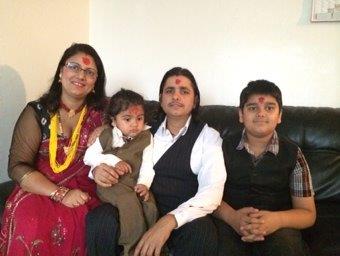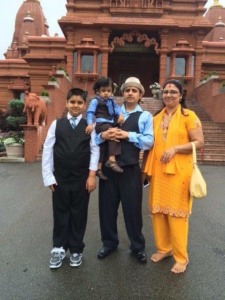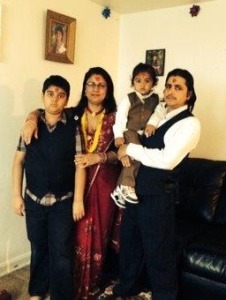Forced from home: Saraswati’s story
Chapter 1
Fleeing Bhutan

“Where can I go? How can I survive?” These are questions that ten-year-old Saraswati and her family faced after being forced from their home in Bhutan nearly thirty years ago.
When the Bhutanese government pounded on Saraswati’s door, the family had only moments to gather their most precious belongings and leave their home, farm, and country to seek refuge elsewhere.
“My parents were crying. My little brother was crying,” Saraswati remembered. “It was very scary. We did not get beaten—but others did.”
They started on their journey to Nepal with a group of neighbors and friends who were also forced to leave. When they arrived in Nepal, at an area that had not yet been developed, Saraswati’s group felt it looked like a place to build a community.
“We cut down the trees and cleared space,” Saraswati explained. “We had brought some bamboo, but collected more, and built shelter.”
Saraswati, her parents and five siblings would go on to live in this one-room bamboo shelter for 18 years. The community they started became a populated refugee camp called Beldangi.
Life was not easy. Food from United Nations High Commission for Refugees was scarce and rationed. Getting water was a three-hour endeavor. Often times heat was hard to handle, and winters were even more brutal. Fires broke out frequently throughout the camp, and thieves would reach through the bamboo walls of shelters to steal people’s belongings while they slept.
But during this time, life went on. Saraswati attended a school that developed within the camp through a program called Caritas Nepal, and married her husband, Yadu, at the age of 23. She and Yadu gave birth to their first son, Saroj. The refugees within the camp became family, celebrating holidays, birthdays and weddings together.
For 18 years, Saraswati’s family looked for ways to return to Bhutan—home. They were still not allowed, so to escape the harsh life, they looked for refuge in the United States.
Chapter 2
Finding Refuge

Finally, the day came for Saraswati, Yadu, five-year-old Saroj and their families to travel to their new homes. But leaving the refugee camp was a bitter-sweet feeling, after spending 18 years there, making friends and building a community.
“The day we left one side was happy. We were going to leave this life, and we hear there is a house for us in the United States that is comfortable, has a refrigerator and lights,” Saraswati said. “But the other side, we lived there for 18 years and all of the families were not moving together. We cried together.”
After they said their goodbyes, Saraswati and her family, including her husband, in-laws and child, began their long journey to the United States. After traveling several days they reached the airport in Kathmandu where they boarded a 24-hour flight to reach the United States.
There, they were overcome with joy when they entered their new home, which was still small but had running water, a refrigerator, furniture – a huge improvement and lifestyle change from the bamboo shelter they had called home for 18 years. However, it was still difficult to adjust after such a huge shift in culture. For instance, in Nepali culture, people do not make eye contact when they speak to one another and, at the time Saraswati and Yadu were there, there were no cell phones or laptops.
“We came here and it was very difficult for us at first. But then we learned slowly how to live here and what the culture is here,” Saraswati remarked.
With her limited English, Saraswati headed out to find a job. She began cleaning hotel rooms, and her English improved with help from coworkers and her courage to speak without the assistance of an interpreter.
They had little help, but they made things work.
Chapter 3
The move to Pittsburgh
After two years near Virginia Beach, Saraswati and Yadu decided to move their family to Pittsburgh in 2011, knowing from fellow former Nepali refugees there were places to find work and affordable housing.
Here, they thrived. They had another child, Samir, and Yadu found a job at Giant Eagle. They found a place to live in Whitehall at Prospect Park, and they found support at SHIM’s Prospect Park Family Center.
“When I came here we had Nepali friends, so they told us about SHIM. If you have a problem, you go and tell them and they will try and help,” Saraswati explained. “There was nothing like SHIM in Virginia.”
From there, Saraswati developed a trust with the staff at SHIM’s Prospect Park Family Center. She attended SHIM’s Women’s Group weekly and found support while she was pregnant with Samir. Saroj attended SHIM’s after school and Youth Mentoring programs and made friends. They signed up for SHIM’s food pantry and were able to obtain food for their family, along with Yadu’s parents.
When Samir was born, Saraswati and Yadu faced some struggles with Samir’s health and behavior. They started utilizing SHIM’s home visiting services, where SHIM staff members Jennifer and Lori referred them to a local doctor. They discovered Samir was lactose intolerant. His behavior also started to improve as he grew and continued learning with SHIM, during both home visiting and the preschool program.
“I got a lot of help from the Family Center. We feel comfortable and safe there,” Saraswati explained. “When Samir was little, it really helped. We got a car seat. If we needed something, if we needed to make an appointment, we knew they were here. Everyone in this neighborhood helps each other.”
Chapter 4
Becoming self-sufficient

Last year, Saraswati and Yadu were able to save up enough money to buy a house. This had been a dream of theirs since their arrival in the United States. The four of them, along with Yadu’s parents and sister, made the move to Pleasant Hills.
“It’s good to live in a house. We are happy to be on our own,” Saraswati said.
Saraswati knows SHIM’s Family Center is there if they need anything, and Saroj is still very active in the Youth Mentoring program, learning a healthy lifestyle and getting prepared for college. Local families can come to the Family Center for anything from having a fax sent to making a doctor’s appointment to getting tax help and beyond.
“We know SHIM is always here for us when we need help,” Saraswati added.
Last year, both Yadu and Saraswati became United States citizens and are happy to call Pittsburgh their home.
“I am not a refugee anymore; Yadu, Saraj, Samir and I are all citizens of the United States,” Saraswati said.
More stories
Read more stories about your neighbors
Test your refugee IQ
Take the quiz and see how well you know your refugee neighbors.
Get involved
Learn more about volunteer opportunities, host a food drive, or donate to support SHIM’s work.

